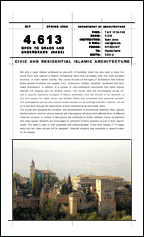Faculty» Past Faculty
Lecturer
(Visiting Faculty Spring 2004)
Spring 2004 course
 |
4.613 Civic and Residential Islamic Architecture
Prerequisites: open to grads and undergrads (HASS) Not only a major religion professed by one-sixth of humanity, Islam has also been a major historical force that inspired a distinct civilizational flavor that permeated even the most mundane functions in every Islamic society. This course focuses on the types of architecture that embody these societal functions: the palatial, civic, commercial, military, industrial, residential and landscape architecture, in addition to a number of little-understood monuments that stand midway between the religious and the profane realms. The course uses the chronological survey format to examine distinctive examples of Islamic architecture from the seventh to the twentieth century and analyze the urban, social, and political factors that constituted their particular contexts. The investigations will not only consult modern studies on the buildings and their histories, but will try to see them through the experiences of their contemporaries and actual users.
The course also assesses the formation and developments of architectural traditions, their regional transformations, and the various external and interregional influences that affected them at different historical junctions. A number of discussions are scheduled to further address critical architectural and urban issues. Students are encouraged to contribute to these sessions as part of their requirements. The class is open to both graduates and undergraduates. Three short essays (7-10 pages each) and two class quizzes will be assigned. Graduate students may substitute a research paper for the essays. |